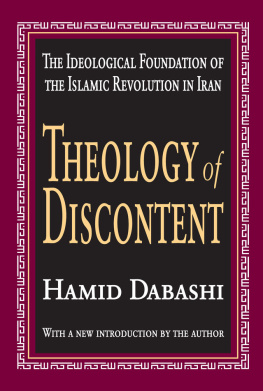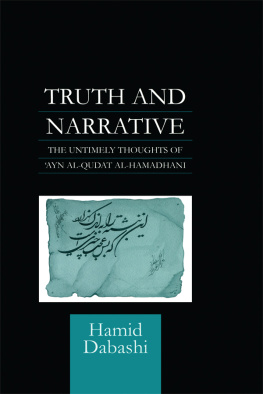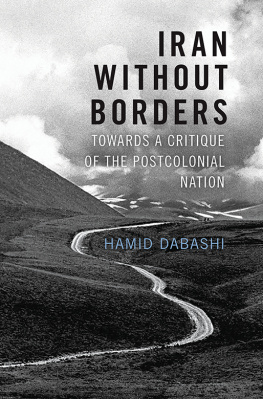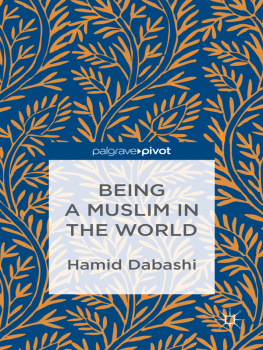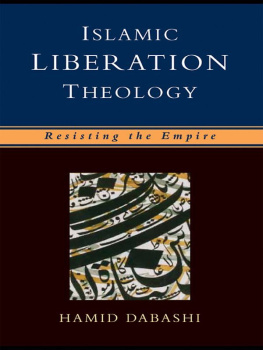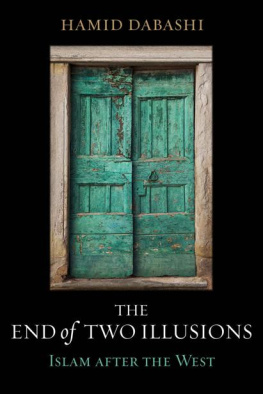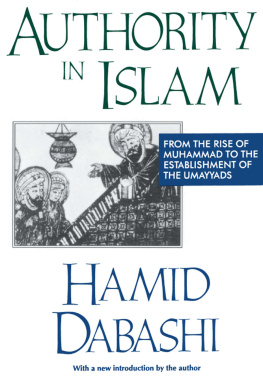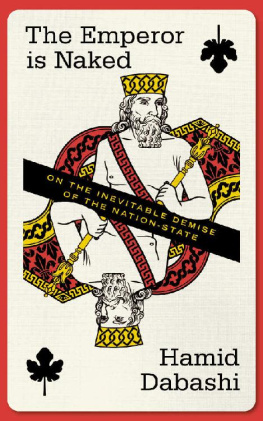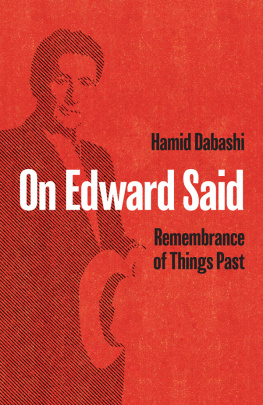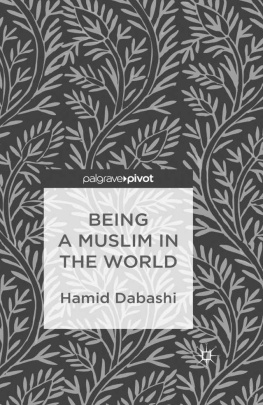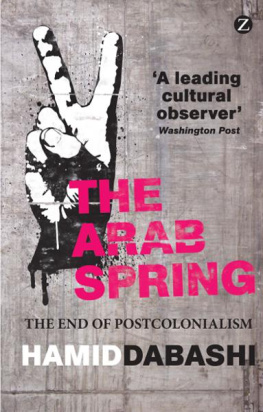Hamid Dabashi - Theology of Discontent
Here you can read online Hamid Dabashi - Theology of Discontent full text of the book (entire story) in english for free. Download pdf and epub, get meaning, cover and reviews about this ebook. year: 2017, publisher: Taylor and Francis, genre: Politics. Description of the work, (preface) as well as reviews are available. Best literature library LitArk.com created for fans of good reading and offers a wide selection of genres:
Romance novel
Science fiction
Adventure
Detective
Science
History
Home and family
Prose
Art
Politics
Computer
Non-fiction
Religion
Business
Children
Humor
Choose a favorite category and find really read worthwhile books. Enjoy immersion in the world of imagination, feel the emotions of the characters or learn something new for yourself, make an fascinating discovery.
- Book:Theology of Discontent
- Author:
- Publisher:Taylor and Francis
- Genre:
- Year:2017
- Rating:5 / 5
- Favourites:Add to favourites
- Your mark:
- 100
- 1
- 2
- 3
- 4
- 5
Theology of Discontent: summary, description and annotation
We offer to read an annotation, description, summary or preface (depends on what the author of the book "Theology of Discontent" wrote himself). If you haven't found the necessary information about the book — write in the comments, we will try to find it.
Theology of Discontent — read online for free the complete book (whole text) full work
Below is the text of the book, divided by pages. System saving the place of the last page read, allows you to conveniently read the book "Theology of Discontent" online for free, without having to search again every time where you left off. Put a bookmark, and you can go to the page where you finished reading at any time.
Font size:
Interval:
Bookmark:
THEOLOGY of DISCONTENT
THE IDEOLOGICAL FOUNDATION OF THE ISLAMIC REVOLUTION IN IRAN
Hamid Dabashi
With a New Introduction by the Author

First published 2006 by Transaction Publishers
Published 2017 by Routledge
2 Park Square, Milton Park, Abingdon, Oxon OX14 4RN
711 Third Avenue, New York, NY 10017, USA
Routledge is an imprint of the Taylor & Francis Group, an informa business
New material this edition copyright 2006 by Taylor & Francis.
All rights reserved. No part of this book may be reprinted or reproduced or utilised in any form or by any electronic, mechanical, or other means, now known or hereafter invented, including photocopying and recording, or in any information storage or retrieval system, without permission in writing from the publishers.
Notice:
Product or corporate names may be trademarks or registered trademarks, and are used only for identification and explanation without intent to infringe.
Library of Congress Catalog Number: 2005053849
Library of Congress Cataloging-in-Publication Data
Dabashi, Hamid, 1951
Theology of discontent: the ideological foundations of the Islamic
Revolution in Iran / Hamid Dabashi.
p. cm.
With a new introduction by the author.
Includes bibliographical references and index.
ISBN 1-4128-0516-3 (alk. paper)
1. Sho'hIranHistory20th century. 2. Islam and stateIran.
3. Religion and politicsIran. 4. IranPolitics and government1979
1997. I. Title.
BP63.I68D33 2005
320.5'57'0955dc22 2005053849
ISBN 13: 978-1-4128-0516-2 (pbk)
In Memoriam Ali Alemohammad (1922-1991) more than a father
More than a decade has passed since the initial publication of my Theology of Discontent. Much has happened in world history that warrants a reconsideration of my argument and the evidence I put forward in some considerable detail in this book.
I started working on Theology of Discontent soon after the events of the mid-1970s, leading to the Islamic Revolution of 1979 in Iran, had made it globally evident that we were witnessing a critical event in world history. The ideological preparation for this massive social revolution had been articulated for almost a century, from the immediate foregrounding and then the aftermath of yet another revolution, the Constitutional Revolution of 1906-1911. I began reading the works of the most prominent ideologues of the revolution, those alive thenKhomeini, Motahhari, Taleqani, Bazargan, Tabataba'i, and Bani-Sadrand those already departedAl-e Ahmad and Shari'ati. At the writing of this new introduction all of these prominent harbingers of the Islamic Revolution are dead except Abu al-Hasan Bani Sadr. But the events before and after what has now assumed the iconic atemporality invested in die sign and signature of "9/ 11" (no longer even in the need of adding 2001) have made what I had to say and argue then far more critically significant now. Given the rapidity of events in world history,, books of this sort ordinarily lose their timeliness Theology of Discontent, however, seems to have assumed a new, entirely unanticipated, significance. Given the dangerous disposition of the world in which we live today, I am not quite sure if I can say that I am pleased that my book has found this renewed significance. In fact, I am positively certain I wish it had not.
I "wrote Theology of Discontent in the heat of a monumental event in the contemporary history of my homeland. There is a spontaneity of narrative, an urgency of registering something quintessential about a sweeping social event about Theology of Discontent that now, a mere decade later and yet a whole different world in our discursive imagination requires framing of a different sort. I am grateful for the opportunity to take the picture I began drawing about a quarter of a century ago and frame it in what I believe to be a more enduring perspectiveperhaps a permanendy changed worldview.
But what I did not see at the time, lost as I was in the details of what I was trying to figure out in its immediate Iranian context, was the more global implication of the historic event I was busy documenting global, that is, both in terms of its historical sweep and pertinence to its geographical domain. In this new introduction, I wish to reflect on those wider implications, re-articulate my initial thoughts, first put forward in hairsplitting detail in this book, in conversation with much that has happened since its initial publication, and also in dialogue with more recent scholars who, excited by the spectacular events of 9/11, have been quite cavalier in their thoughts and very much in a hurry to make grandiloquent remarks about "Islam and the West," irrespective of the historical provenance of this categorical invention. I disagree with these scholars, find their hurried enthusiasm wanting in detail, see things quite differently than they do, and wish, with all due respect, to state my case here in some analytical detail. The advantage of Theology of Discontent is that it was researched and written decades before the events of 9/11. I hope to remedy its historical limitations by expanding on its thematic and theoretical propositions here.
My main task in Theology of Discontent was to locate the ideological formation of the Islamic Revolution in Iran in the larger context of sociology of ideology in general and in its immediate historical context in particular. I wanted to see and suggest the epistemic topography of this ideological formationwhere, whence, why, and how it was articulated. My principal argument in this book was that "Islamic Ideology," as a kind of Kantian categorical imperative, was formed in dialectical conversation with "the West," itself a categorical invention of European (colonial) modernity. This dialogical perspective shaped my principle position concerning the rise of "Islamic ideology," in the widest and most generic sense of the term that ranges from the ideas of Jamal al-Din al-Afghani (1838-1897) early in the nineteenth century to those of Ali Shari'ati (1933-1977) late in the twentieth: that this ideology emerged out of a dialectical conversation with the colonial construction of "the West" as its main interlocutor.
is not only essentialist and power-basing, it is (in my judgment even worse) also monologically positivist. It asserts. It does not propose. It proclaims. It allows for no debate. It discovers. It does not debate. It has a missionary zeal and revelatory sense to it. "Here is Islamlet me now tell you what it is;" or "there is Iranlet me tell you about its history." It does not place the constituent particulars of Islam or of Irantheir laws, art, literature, music, dogma, jurisprudence, or philosophy in a larger (comparative, theoretical, speculative) frame of dialogical references. Its proclamations are thus predicated on a code of declamatory conduct, not matters of theoretical speculation, analytical propositions, factual evidence, corroborative arguments, nor are they subject to systematic doubt and challenge. I wanted to place whatever I had to say about the Islamic ideology and the revolution it had foretold within the domain of a more theoretical debate, of analytical propositions, historical comparison, all with detailed attention to factual evidence.
My theoretical attention to the body of scholarship on sociology of ideology was commensurate with a dialogical conception of colonial modernity as the principal catalyst of world-historical changes. I never had the opportunity in the first edition of this book, nor indeed did I have the historic awareness or the necessary theoretical tools, to put forward the full panoramic perspective of what had informed my way of looking at the colonial encounter of Islam with modernity, It was long after the publication of Theology of Discontent that I began to understand, and articulate to myself in some detail, what had happened historically to a world religion in the course of its colonial encounter with capitalist modernity. Modern Islamic history, or the predicament of Islam (as a world religion) in modernity, or in fact the predicament of any world religion, cannot be separated from the global consequences of colonial modernity. Christianity in its mutation into "liberation theology" is as much aftected by die colonial consequences of capitalist modernity in Latin America as Islam has been in its transformation into "Islamic ideology" in much of the Islamic world. As both an economic and a political project, colonially mitigated modernity has been the single most powerful source of global change in modern history and as such has had a catalytic effect on every culture and every religion it has touched.
Next pageFont size:
Interval:
Bookmark:
Similar books «Theology of Discontent»
Look at similar books to Theology of Discontent. We have selected literature similar in name and meaning in the hope of providing readers with more options to find new, interesting, not yet read works.
Discussion, reviews of the book Theology of Discontent and just readers' own opinions. Leave your comments, write what you think about the work, its meaning or the main characters. Specify what exactly you liked and what you didn't like, and why you think so.

